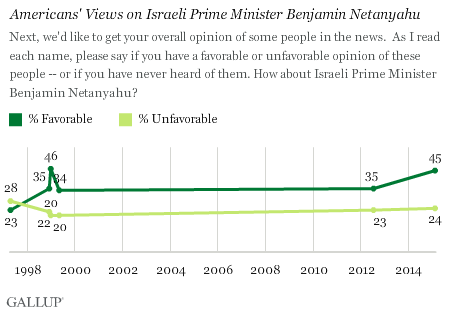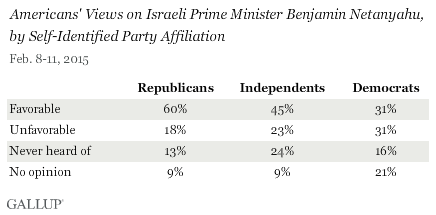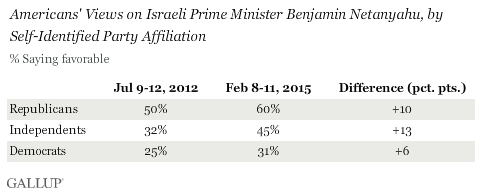Story Highlights
- 45% see Netanyahu favorably, a statistical tie with his 1998 rating
- His favorable rating improved 10 points since 2012
- Republican support increases by 10 points since 2012
WASHINGTON, D.C. -- Ahead of Israeli Prime Minister Benjamin Netanyahu's speech to the U.S. Congress that has strained relations between Israel and the White House, nearly twice as many Americans view Israel's leader favorably (45%) as unfavorably (24%). Netanyahu's favorable score is up from 35% in 2012. His current favorable rating ties his highest rating among the six times Gallup has measured it, spanning his three tenures as prime minister.

While Netanyahu's favorable score has varied slightly over the years, his unfavorable score has been relatively stable, ranging from 20% to 28%. Notably, even while his favorable score increased since 2012, his unfavorable score stayed about the same. Meanwhile, fewer Americans have no opinion of Netanyahu today than did so in 2012, with 31% vs. 41%, respectively, either saying they are unsure or have never heard of him.
These results come from the annual Gallup World Affairs poll, conducted Feb. 8-11. This week, Netanyahu will address a joint session of Congress. He is expected to make a forceful case against any agreement the U.S. and five other nations might strike with Iran to limit Iran's nuclear program. Republican House Speaker John Boehner issued the invitation to the Israeli prime minister without first notifying the White House, an unusual step that many Democrats and White House officials have interpreted as an effort to undermine Obama's diplomatic negotiations with Iran.
But even if Netanyahu has seen his relationship with the White House deteriorate, it appears to have had no impact on his standing with the American people.
Republicans Now See Netanyahu Much More Favorably
Though the American public in general views Netanyahu more favorably than unfavorably, there are sharp party differences in these views. Republicans are much more likely to view Netanyahu positively (60%) than negatively (18%), while Democrats are evenly divided in their views of him: 31% favorable and 31% unfavorable. Independents' favorable ratings of Netanyahu are twice as high as their unfavorable ratings.

Despite White House and other prominent Democratic officials' criticism of Netanyahu's visit, his favorable rating has improved among all major party groups since 2012. The increase has been slightly higher among independents (+13 points) and Republicans (+10 points) than Democrats (+6 points). Democrats are slightly more likely now to see Netanyahu favorably compared with 2012 -- the well-broadcast break with the Obama administration in recent weeks notwithstanding.

Bottom Line
Despite Americans' support for Israel and a long history of close ties between the two countries, Netanyahu has found himself in a major political controversy by coming to Washington to address Congress against the wishes of the White House. But the political tension felt in the nation's capital has not hurt Netanyahu's image with the American public at large. Americans see him about as favorably today as they did at any of the six measurements Gallup has taken since 1996. The dust-up with the White House may have won Netanyahu more independent and Republican admirers while at the same time not costing him Democratic support.
Survey Methods
Results for this Gallup poll are based on telephone interviews conducted Feb. 8-11, 2015, with a random sample of 837 adults, aged 18 and older, living in all 50 U.S. states and the District of Columbia. For results based on the total sample of national adults, the margin of sampling error is ±4 percentage points at the 95% confidence level. All reported margins of sampling error include computed design effects for weighting.
Each sample of national adults includes a minimum quota of 50% cellphone respondents and 50% landline respondents, with additional minimum quotas by time zone within region. Landline and cellular telephone numbers are selected using random-digit-dial methods.
View complete question responses and trends.
Learn more about how Gallup Poll Social Series works.

